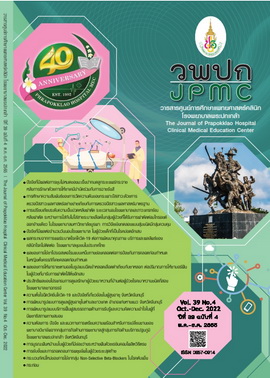Withholding and Withdrawing Life-sustaining Treatment in Palliative Care
Main Article Content
Abstract
Medical life support refers to the devices used to treat critically ill patients experiencing organ failure so that the patients may receive treatment until the apparatuses can finally be removed. In cases where the patient experiences incurable disease during the final stages of life, these aids are of no use to the patients and can cause them to suffer. If the patient or their relatives wish to terminate life support to alleviate the patient’s suffering or to take the patient home to die, stopping life support can be done legally.
When considering whether to withhold life support to a patient or to withdraw a patient from life support, It is crucial to communicate with the patient or the patient’s relatives with tenderness and compassion and to considering the patient’s level of comfort. Support should also be provided to the patient’s family during the situation so that they do not feel guilty about the decision, and relevant health teams should be provided with training to continually develop their ability to care for patients.
Article Details

This work is licensed under a Creative Commons Attribution-NonCommercial-NoDerivatives 4.0 International License.
References
Thai Palliative Care Society. Textbook of palliative care. KhonKaen: Thai Palliative Care Society; 2021.
Emanuel LL, von Gunten CF, Ferris FD. EPEC Education for Physicians on End-of -Life Care; Module 5: Physician-assisted-suicide [Internet]. 1999[cited 2021 Feb 18]. Available from: https://kipdf.com/epec-physician-assisted-suicide-module-5-participant-s-handbook-education-for-ph_5b17e8307f8b9a311e8b45df.html
FitzPatrick WJ. The doctrine of double effect: intention and permissibility. Philosophy Compass 2012;7(3):183–96.
Emanuel LL, von Gunten CF, Ferris FD. EPEC Education for Physicians on End-of -Life Care; Module 11: Withholding withdrawing therapy [Internet]. 1999 [cited 2021 Feb 18]. Available from: https://kipdf.com/epec-withholding-withdrawing therapy-module-11-participant-s-handbook-education-_5ab0040e1723dd339c804002.html
O'Mahony S, McHugh M, Zallman L, Selwyn P. Ventilator withdrawal procedures and outcomes. Report of a collaboration between a critical care division and a palliative care service. J Pain Symptom Manage 2003;26:954-61.
Council on Ethical and Judicial Affair, American Medical Association. Guideline for the appropriate use of do-not-resuscitate orders. JAMA 1991;265:1868-71.
White DB. Withholding and withdrawing ventilatory support in adults in the intensive care unit. UpToDate [Internet]. 2022 [cited 2022 Apr 13]. Available from: https://www.uptodate.com/contents/withholding-and-withdrawing-ventilatory-support-in-adults-in-the-intensive-care-unit
Treece PD, Engelberg RA, Crowley L,Chan JD, Rubenfeld GD, Steinberg KP, et al. Evaluation of a standardized order form for the withdrawal of life support in the intensive care unit. Crit Care Med 2004;32:1141-8.
Cooke CR, Hotchkin DL, Engelberg RA, Rubinson L, Curtis JR. Predictors of time to death after terminal withdrawal of mechanical ventilation in the ICU. Chest 2010;138:289-97.
Truog RD, Cist AF, Brackett SE, Burns JP, Curley MA, Danis M, et al. Recommendations for end-of-life care in the intensive care unit: the ethics committee of the society of critical care medicine. Crit Care Med 2001;29:2332-48.
Elbaih AH, Basyouni FH. Teaching approach of primary survey in trauma patients. SunText Review of Surgery [Internet]. 2020 [cited 2021 Feb 14];1;1-7. Available from: https://suntextreviews.org/doi/pdf/10.51737/2766-4767.2020.001
White DB, Braddock CH 3rd, Bereknyei S, Curtis JR. Toward shared decision making at the end of life in intensive care units: opportunities for improvement. Arch Intern Med 2007; 167:461.
Seaman JB, Arnold RM, Scheunemann LP, White DB. An integrated framework for effective and efficient communication with families in the adult intensive care unit.Ann Am ThoracSoc [Internet]. 2017[cited 2022 Feb 14];14:1015-20. Available from: https://www.ncbi.nlm.nih.gov/pmc/articles/PMC5566311/pdf/AnnalsATS.201612-965OI.pdf
White DB, Angus DC, Shields AM, Buddadhumaruk P, Pidro C, Paner C, et al. A randomized trial of a family-support intervention in intensive care units. N Engl J Med 2018;378:2365-75.

